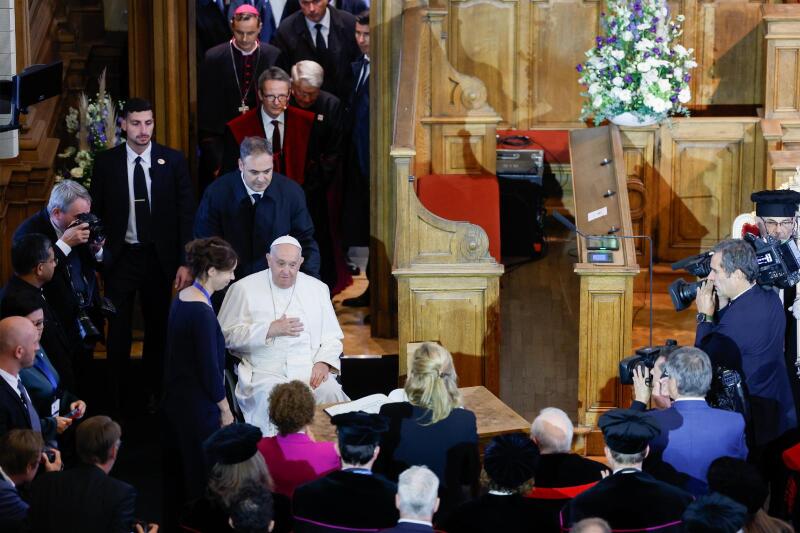
Seeking truth requires taking risks, questioning, pope says
Carol Glatz, Catholic News Service
10/01/2024
LEUVEN, Belgium (CNS) — An easy, effortless and comfortable "faith" that refuses to call things into question is dangerous, Pope Francis told professors, researchers and staff at the world's oldest Catholic university.
The same is true for knowledge, he said. "Searching for the truth is indeed tiring since it obliges us to move out of ourselves, to take risks, to ask ourselves questions."

Pope Francis arrives at KU Leuven, a Catholic research
university in the city of Leuven, Belgium, Sept. 27, 2024.
Founded in 1425 with a decree by Pope Martin V, it is the
oldest Catholic university in the world.
CNS photo/Lola Gomez
"A superficial life is more appealing to us, one that does not deal with new challenges," he said Sept. 27 during a gathering at the Dutch-speaking KU Leuven, a Catholic research university in the city of Leuven. And "there is likewise the danger of being attracted to an easy, effortless and comfortable 'faith' that does not call anything into question."
Founded in 1425 with a decree by Pope Martin V, KU Leuven is one of the oldest universities in Europe. Alumni include Father Georges Lemaître, who proposed the "Big Bang" theory of the universe, and Father Desiderius Erasmus of Rotterdam, who was a major influence in philosophy and culture during the Renaissance.
The focus of the pope's Sept. 26-29 visit to Belgium was to help celebrate the university's 600th anniversary; he was to meet students at its French-speaking campus, UCLouvain in Louvain-la-Neuve, Sept. 28.
In his introductory speech, Luc Sels, rector and vice chancellor of KU Leuven, emphasized the importance of being an institute that today is independent from the Catholic Church and yet is still inspired by Christian values.
This independence is "our greatest value to the church," he said, because "our university can be a critical partner, a place for open discussion" that inspires, "but also challenges the Catholic community" and "equally dares to challenge society" with its Christian worldview.
The university intentionally makes "room for dissent," he said, noting that the pope has also "opened this space for dialogue and contradiction within the church," particularly through the practice of synodality.
The rector highlighted the importance of welcoming and accommodating students and scholars who live in danger in their homelands. It is part of the university's "creative openness" toward those who seem different because of their religion, culture, political mindset or place of origin, "but with whom we deeply share our humanity," he said.
Pope Francis praised the welcoming environment they created for so many refugees. "While some people call for the reinforcement of physical borders, you have expanded borders as a university community."
"What we need is a culture that expands boundaries," he said, urging them to foster "a culture of inclusion, compassion and attentiveness toward the weakest as you seek to overcome the great challenges of our world today."
After his talk, the pope met with a group of refugees gathered in a room behind the main hall. He then rode in a small electric golf cart to greet thousands of people lining the roads outside the university toward Leuven's Great Market Square.
-
